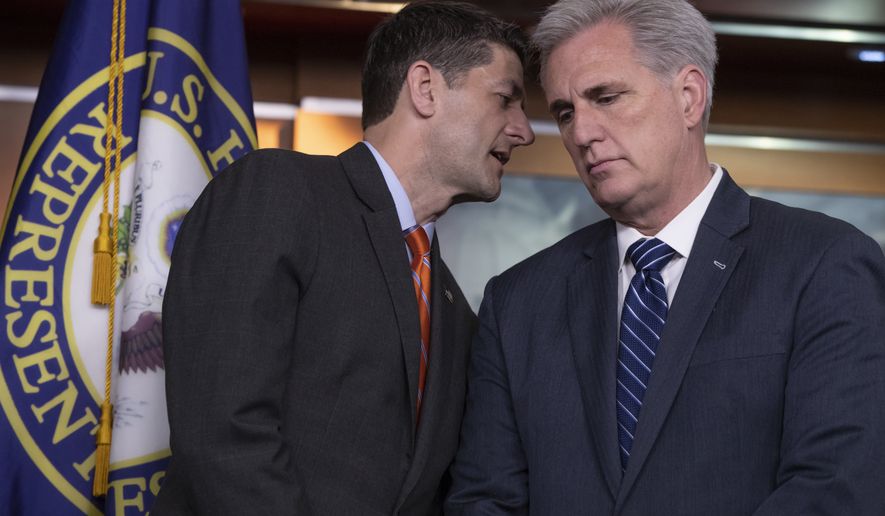House Republicans have reached a deal to vote on two immigration bills next week, Speaker Paul D. Ryan’s office said Tuesday, setting the stage for a high-stakes floor showdown over the fate of millions of illegal immigrants.
House Republicans will hash out the options at a closed-door meeting Wednesday morning, said AshLee Strong, Mr. Ryan’s spokeswoman.
The mere act of scheduling votes is symbolically huge. It will be the first time since Republicans retook control of the chamber in 2010 that they have put a major legalization bill on the floor.
But the fact that two bills will be put on the floor suggests there is still no unanimity within the party on how far to go on legalization of “Dreamers,” nor on how to stiffen border security and interior enforcement to prevent another wave of unauthorized migration.
The announcement did, however, defuse a petition drive backed by rebel Republicans and Democrats that had threatened to sideline Republican leaders and turn control of the issue over to the minority.
“Members across the Republican Conference have negotiated directly and in good faith with each other for several weeks, and as a result, the House will consider two bills next week that will avert the discharge petition and resolve the border security and immigration issues,” Ms. Strong said.
Her announcement came after a series of intense negotiations. Conservatives and moderates met in Mr. Ryan’s office for more than 90 minutes Tuesday afternoon, emerging to say they were making progress. They retreated to their own corners to see how far each was willing to bend.
“We don’t have a deal at this point. We’re at the midnight hour,” Rep. Mark Walker of North Carolina, one of the conservative leaders, told reporters as he emerged from the talks in Mr. Ryan’s office.
They were racing a self-imposed Tuesday deadline to head off the petition drive.
Under arcane House rules, if the “discharge petition,” as it’s official known, had gotten 218 signatures by Tuesday it would have forced a free-wheeling debate on four different bills, including two Democratic-backed alternatives, at the end of this month.
But the House recessed with just 216 signatures Tuesday — two shy of the number needed.
Now, the next possible chance for floor action from the petition drive would be the end of July.
Still, the petition put pressure on Republican leaders, who worked feverishly to strike a compromise between the moderates and conservatives.
Both sides seem to agree on granting some form of more-permanent legal status to Dreamers, the young adult illegal immigrants who came to the U.S. as children, and who are seen as the most sympathetic figures in the immigration debate.
But whether that includes full citizenship rights, whether they will be able to then sponsor their parents who broke the law to bring them to the U.S., and what additional immigration restrictions will be added on are all in negotiations.
Republican leaders had begged moderates not to sign onto the petition drive, saying it would effectively grant control of the floor to Democrats.
They pleaded for all sides to stay in the ongoing talks.
“We still don’t have an agreement, but you have seen members from a lot of different sides of this issue come together in a real committed way to try to find an agreement,” Majority Whip Steve Scalise said Tuesday evening. “We are going to keep working at it.”
Under the petition drive, four bills would have come to the floor — though all the momentum would have been behind a version worked out by the Republican rebels and Democrats that would combine citizenship for more than 2 million illegal immigrants with promises of a future study of border security.
Republican leaders would also be allowed to offer a bill of their choosing — though without agreement in their own ranks, it’s unlikely it would surmount the Democratic alternative.
Mr. Ryan’s counterproposal, instead, envisions two bills.
One of those is likely to be an enforcement-heavy plan written by Rep. Bob Goodlatte, Virginia Republican and chairman of the Judiciary Committee. The other bill is likely to emerge from the ongoing negotiations.
Whatever the House votes on, it’s not clear that there’s a path to becoming law.
Senators tried to find an immigration compromise earlier this year, only to stumble.
Any bill that can get the approval of GOP leaders in the House is likely to draw a Democratic filibuster in the Senate. But any bill that could pass with Democratic votes is likely to be vetoed by President Trump, Republicans say.
• Seth McLaughlin can be reached at smclaughlin@washingtontimes.com.




Please read our comment policy before commenting.